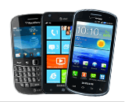Cell Phone Battery Safety – How to Prevent Exploding Batteries
As reports of cell phone battery explosions increase, manufacturers and consumer advocates advise a handful of precautions to lessen the chances of a mishap.
“We don’t want to scare anybody, because there is a huge market out there; but we have had problems with batteries, and in many instances, the chargers,” said Scott Wolfson, spokesman for the U.S. Consumer Products Safety Commission.
Why do Cell Phone Batteries Explode?
[su_youtube_advanced url=”https://youtu.be/mhYdnuMYuDE” modestbranding=”yes” https=”yes” playsinline=”yes”]
Cell phone safety experts say it’s generally best to use batteries recommended by the handset maker.
-
- Look for a “UL” logo on any battery you use. That certifies that the device has passed industry-standard lithium battery safety tests.
Many incidents have involved unapproved products and counterfeits that can be identified with some rudimentary knowledge. - Manufacturers such as market leader Nokia now publish guides to assist consumers in identifying fraudulent products. A Nokia primer on counterfeit batteries includes photos of fake goods, with well-marked explanations that point out identifying features.
- Misspelled words, “Made In China” stickers and unevenly printed or crookedly applied labels are all surefire signs of a counterfeit, Nokia warns.
- Even genuine products are not immune to failure.
- Before buying a replacement battery, or a spare, check with consumer protection agencies such as the Consumer Products Safety Commission for information on recalls, wireless-product safety experts suggest.
- Look for a “UL” logo on any battery you use. That certifies that the device has passed industry-standard lithium battery safety tests.
Battery Safety Made Easy
Batteries are an ever increasing important part of everyday life. They can be found in our key chains, iPods, television remotes, laptops and of course, in our cell phones. We don’t tend to give them much thought until they stop working. But, with more than 230 million American wireless consumers making billions of calls every year, we as consumers should make sure we are mindful of the guidelines on wireless device and battery maintenance. Just as you should regularly service your car, why not be aware of the service your wireless device might need, since you most likely use it more.
Battery Basics
The most common type of battery found in today’s cell phones are Lithium-ion (Li-Ion) batteries. These batteries have a lot of energy in a small package enabling longer battery life and more robust devices.
Li-Ion batteries are different then typical alkaline batteries, which are found throughout your home in things such as toys, flashlights and TV remotes. While it is highly unusual, there have been reports of overheating, fire, and ruptures in connection with the use of Li-Ion batteries. Therefore, consumers should be aware that Li-Ion batteries can react differently to a variety of pressures and impacts and need to be treated with care.
Battery Safety Recommendations
CTIA and the U.S. Consumer Product Safety Commission have developed a list of seven simple and easy consumer recommendations to help promote the safe use of cell phones, batteries and chargers.
Consumers should buy manufacturer or carrier recommended products and accessories designed for their wireless devices. Do not use incompatible cell phone batteries and chargers. Be wary of buying cheap batteries with what appears to be a name brand, as they might be counterfeit products that are not properly manufactured and could pose
safety hazards. If you have any questions about the compatibility of a battery or a charger, contact the manufacturer.
What Can I do to help prevent my cell phone battery from exploding?
- Do not permit your battery’s terminals to come in contact with metal objects such as coins, keys or jewelry. This could happen if you put the battery in your pocket, purse, or coin tray.
- Do not crush, puncture, or place a high degree of pressure on the battery, such as sitting on the phone or battery.
- Do not drop your cell phone. If you do drop your cell phone, especially on a hard surface, it could overheat and potentially cause damage to the phone and the battery.
- If you suspect damage to your cell phone or battery, take it to a service center for inspection.
- Do not place the phone in or near areas that might get very hot, such ason a cooking surface, near a cooking appliance, an iron, glove compartment or radiator.
- Do not get your phone or battery wet. Even though they will dry and appear to be operating normally, the internal circuitry could slowly corrode and pose a safety hazard.
- Follow battery usage, storage, and charging guidelines found in the user’s guide.





